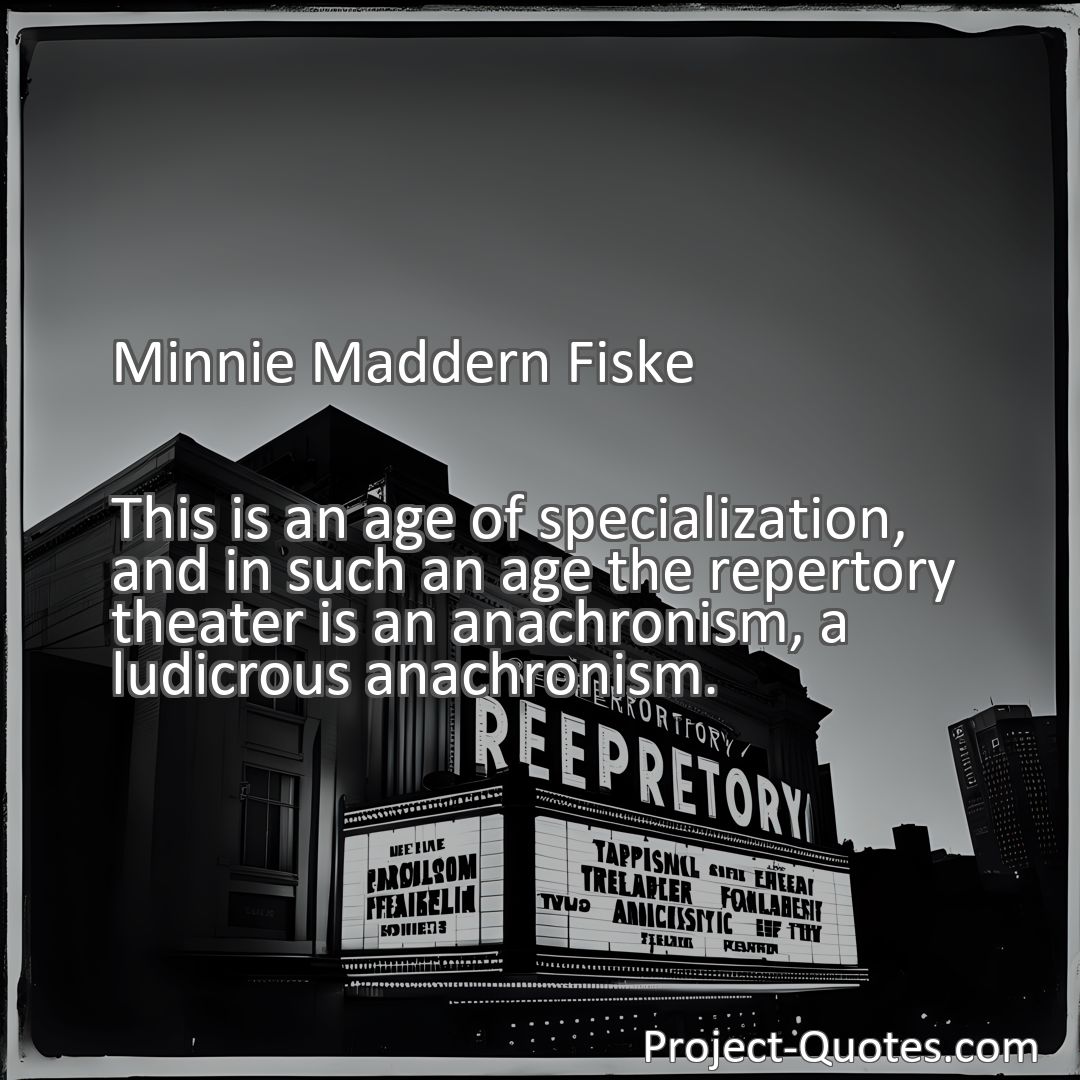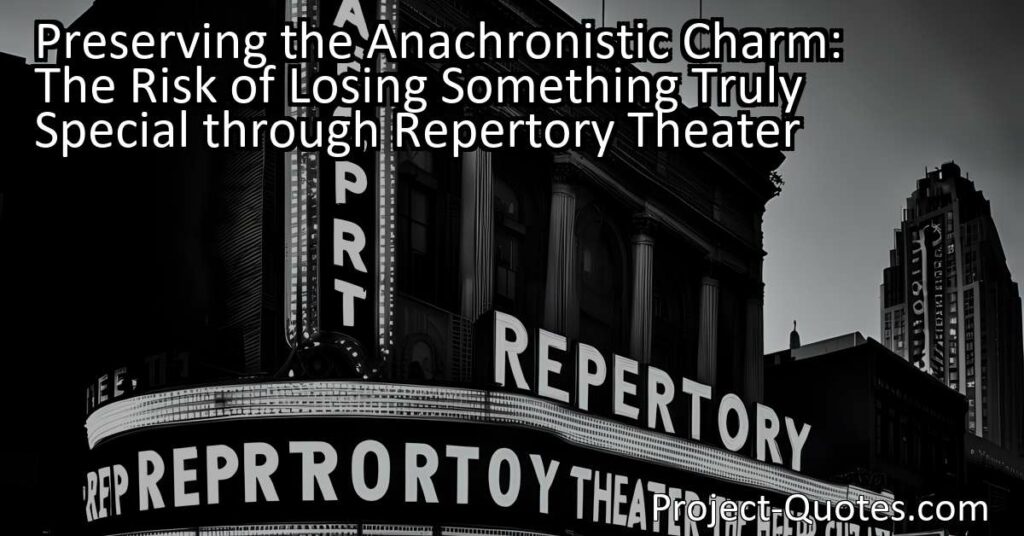This is an age of specialization, and in such an age the repertory theater is an anachronism, a ludicrous anachronism.
Minnie Maddern Fiske
Preserving the Anachronistic Charm: The Risk of Losing Something Truly Special through Repertory TheaterIn today’s specialized world, repertory theater may seem outdated, but dismissing it puts us at risk of losing something truly special. Repertory theater offers diverse genres, fosters versatile actors, cultivates a sense of community, and challenges societal norms. By embracing this unique art form, we celebrate the enduring power of storytelling and artistic expression.
Table of Contents
- 1 This is an age of specialization, and in such an age the repertory theater is an anachronism, a ludicrous anachronism.
- 2 Minnie Maddern Fiske
- 3 Meaning of Quote – This is an age of specialization, and in such an age the repertory theater is an anachronism, a ludicrous anachronism.
- 4 Freely Shareable Quote Image
- 5 Related
Meaning of Quote – This is an age of specialization, and in such an age the repertory theater is an anachronism, a ludicrous anachronism.
In today’s fast-paced and ever-evolving world, it seems that specialization is the key to success. From doctors to engineers, people are encouraged to focus on a specific field and become experts in that area. This trend of specialization has even made its way into the arts, affecting traditional forms of entertainment such as the repertory theater. However, it is essential to remember that while society may be driven by specialization, there is still value in preserving and appreciating the anachronistic charm of repertory theater.
Minnie Maddern Fiske, a renowned American actress, once proclaimed that the repertory theater is a ludicrous anachronism in this age of specialization. Her words capture the spirit of the time, where the modern world is often dismissive of anything that does not fit neatly into its fast-paced, hyper-focused mold. Repertory theater, with its diverse range of plays and performers, may seem out of touch with the demands of specialization. Yet, in dismissing it as a mere relic of the past, we risk losing something truly special.
Repertory theater traces its roots back to the ancient Greeks, who performed a series of plays during festivals like the City Dionysia. These early performances incorporated different genres, from tragedies to comedies, and were often staged in a rotating repertoire. This practice of rotating a set of plays and performers became the foundation of repertory theater as we know it today.
One of the main advantages of repertory theater lies in its ability to showcase a wide variety of talent and genres. Unlike a specialized theater that focuses on a particular style or theme, repertory theaters offer a smorgasbord of performances. Audiences can enjoy everything from classic Shakespearean tragedies to modern-day comedies, providing a diverse range of experiences. This variety allows theatergoers to explore different genres, expanding their understanding and appreciation of the performing arts.
Moreover, the repertory theater provides an ideal platform for aspiring actors and actresses to hone their craft. In specialized theaters, actors may find themselves typecast or limited to specific roles, inhibiting their growth and exploration as performers. In contrast, repertory theater offers a chance for actors to flex their artistic muscles by taking on a variety of characters and genres. This diverse acting experience not only broadens their range but also challenges their skills, culminating in a more versatile and well-rounded performer.
Another significant aspect of repertory theater is its potential to cultivate a sense of community. In an age where technology has diminished personal connections and interactions, repertory theater brings people together in a shared space. The audience becomes part of the experience, collectively reacting to the performances and forming a bond with the actors and fellow theatergoers. This communal aspect fosters a sense of belonging and unity, reminding us of the importance of interpersonal connections in a world increasingly dominated by virtual interactions.
While specialization may be the norm in various aspects of our lives, we should not underestimate the value of encountering new ideas and perspectives. Repertory theater offers an opportunity for individuals to step out of their comfort zones and engage with unfamiliar stories and genres. It challenges our preconceived notions and broadens our understanding of the human experience. In a world that often encourages us to stay within our narrow specialization, repertory theater serves as a reminder of the importance of embracing diversity and celebrating artistic exploration.
It would be remiss not to acknowledge the challenges facing repertory theater in the modern era. The rising costs of production, coupled with a decline in government funding, have made it increasingly difficult for repertory theaters to survive. Many have had to adapt their business models, incorporating more commercially popular plays and reducing their traditional rotating repertoire. However, this adaptability does not diminish the essence of repertory theater; instead, it underscores the need to find a balance between tradition and innovation.
In conclusion, while Minnie Maddern Fiske referred to repertory theater as a ludicrous anachronism, her words should not be taken as a condemnation of this unique art form. Rather, they serve as a reminder of the importance of preserving and cherishing something that may seem out of step with our specialized age. Repertory theater offers a plethora of genres, cultivates versatile actors, fosters a sense of community, and challenges societal norms. It reminds us of the beauty that comes from embracing diversity and celebrating the arts in all their forms. So, let us not dismiss the repertory theater as a mere relic of the past but instead embrace it as a testament to the enduring power of storytelling and artistic expression.
I hope this quote inspired image brings you hope and peace. Share it with someone who needs it today!


